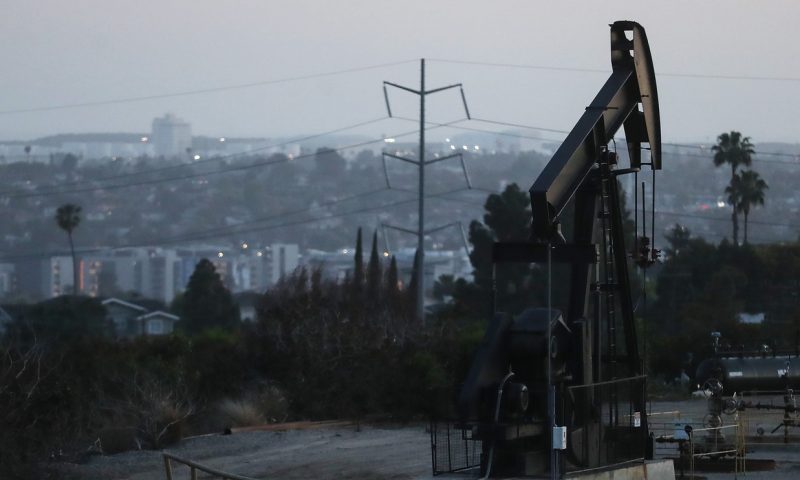Major oil producers begin output cutbacks
Oil futures finished 25% higher on Thursday, paring their loss for the month as traders eyed the outlook for global crude supply, demand and storage capacity.
The market found support for the session on the back of news that major oil companies have announced voluntary crude production cuts and amid signs that storage space for crude won’t run out as quickly as feared.
“Oil prices rallied as investors continue to see a steady stream of headlines of crude production cuts,” said Edward Moya, senior market analyst at Oanda, in a market update.
Norway announced its first cut with production in 18 years, he said. News reports said the country would reduce output by 250,000 barrels per day in June and 134,000 barrels per day during the second half of the year.
Royal Dutch Shell PLC US:RDS said Thursday that it’s cutting its first-quarter dividend for the first time in 80 years, citing the collapse in oil and gas demand and prices. ConocoPhillips US:COP reported a loss for the first quarter and announced a voluntary reduction of crude production by 420,000 barrels per day in June.
“Big oil is starting to have landmark moments that signal deeper production cuts across the globe will be happening quickly,” said Moya.
“Oil prices are looking very constructive because over the next month or two, supply will meet demand,” he said. “Oversupply worries are slowly easing and, with the exception of sudden dislocations in the oil market, crude prices could continue to stabilize.”
West Texas Intermediate crude for June delivery US:CLM20 US:CL rose $3.78, or 25.1%, to settle at $18.84 a barrel on the New York Mercantile Exchange, after a 22% surge on Wednesday. For the month, prices still lost 8%, from the front-month contract settlement on March 31, according to Dow Jones Market Data.
Global benchmark June Brent crude UK:BRNM20, which expired at the end of the session, added $2.73, or 12.1%, at $25.27 a barrel on ICE Futures Europe, with front-month contract prices ending the month 11.1% higher. The most-active July contract UK:BRNN20 gained $2.25, or 9.3%, to end the session at $26.48 a barrel.
Oil has been hit by worries about oversupply by major producers amid the worst viral pandemic in more than century which has wrecked crude demand, while a dearth of places to store the commodity has served to further fuel its descent.
Hope of treatments for COVID-19, with the anticipation that seized up economies will eventually restart, have helped to stabilize expectations for greater appetite for crude in the future. Pledged aid by central bank, including the Federal Reserve and the European Central Bank, may also provide some support for oil bulls.
However, a report from the International Energy Agency released Thursday offered a more sober picture of the oil outlook, describing the COVID-19 pandemic as the “biggest shock to the global energy system in more than seven decades.”
“This is a historic shock to the entire energy world,” said Fatih Birol, executive director of IEA in a statement. “Amid today’s unparalleled health and economic crises, the plunge in demand for nearly all major fuels is staggering, especially for coal, oil and gas,” he said.
On Wednesday, the Energy Information Administration alleviated some fears that oil storage facilities would disappear imminently, showing that U.S. crude inventories rose a smaller-than-expected 9 million barrels for the week ended April 24. It also showed a weekly fall in gasoline stockpiles and total domestic crude production.
“A smaller than expected storage build in the U.S., and also a smaller than expected storage number at the NYMEX deliver point at Cushing has walked back the math by a couple weeks,” wrote Robert Yawger, director of energy at Mizuho Securities U.S.A. in a late Wednesday report, referring to the delivery hub for WTI oil in Oklahoma.
He estimated that there may be more oil storage capacity but says that it might not last for more than a month before facilities are topped out. Storage at Cushing is 12.6 million barrels below maximum capacity of 76 million.
“U.S. storage would reach maximum capacity in 14 weeks with storage at the NYMEX delivery site reaching maximum capacity in 3 to 4 weeks,” he said.
Back on Nymex, prices for petroleum products were mixed, with May gasoline US:RBK20 down 4% at 69.78 cents a gallon and May heating oil US:HOK20 up 5.4% at 73.19 cents a gallon. The May contracts expired at the end of day’s session, with front-month prices for gasoline up 21.7% for the month, but heating oil down 27.7%from the end of March.
June natural gas US:NGM20 rose 4.3% to $1.949 per million British thermal units, with front-month prices up 18.8% in April.
The U.S. Energy Information Administration reported Thursday that domestic supplies of natural gas rose by 70 billion cubic feet for the week ended April 24. That was in line with average expectations for a rise of 69 billion cubic feet, according to a survey of analysts conducted by S&P Global Platts.

